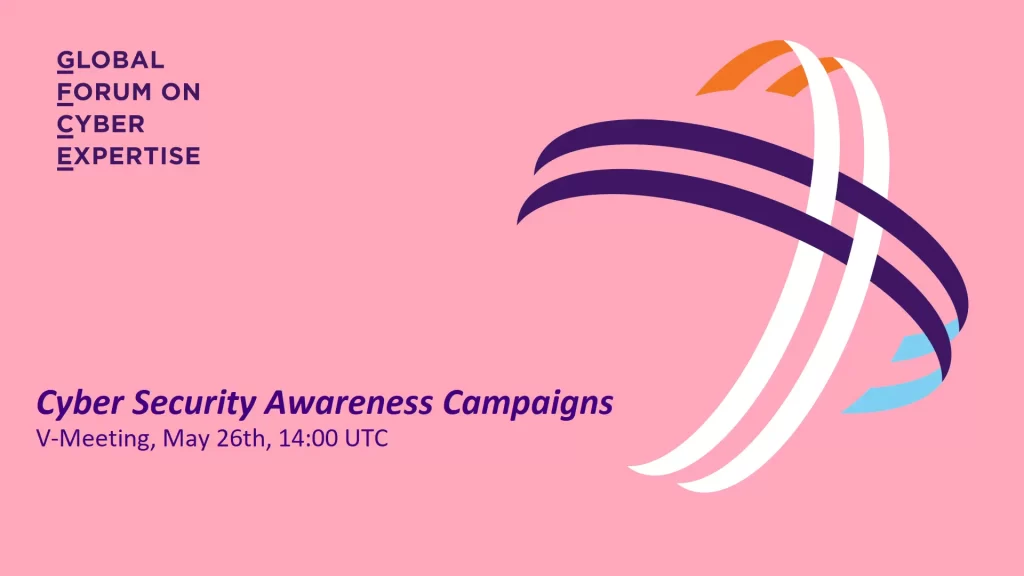Report on the “Cyber Security Awareness Campaigns” Session
Report | GFCE V-Meeting “Cyber Security Awareness Campaigns” | 26 May 2020
This session aimed to exchange experiences and expertise on cyber security awareness by having GFCE Members and Partners showcase and discuss different awareness campaign projects, materials and toolkits. The speaker representatives from APWG, OAS, Microsoft (Cybersecurity Tech Accord), APNIC, Get Safe Online and ENISA discussed challenges, best practices and lessons learned from the perspective of their respective region and/or organization, including those specifically related to current COVID-19 developments.The session was moderated by Ms. Deborah Housen-Couriel, Chair of the GFCE Working Group D on Cyber Security Culture and Skills.
The first speaker that was given the floor was Mr. Peter Cassidy, Co-Founder and Secretary General at the Anti-Phishing Working Group (APWG). Mr. Cassidy elaborated on the globalized deployment for the STOP. THINK. CONNECT. (STC) campaign as a pillar of cybercrime suppression strategies. He emphasized that globally unified cybersecurity messaging is more needed today than ever before. Next, Ms. Zoriana Dmytryshyna, Director of Institutional Relations at APWG.EU, addressed the STC campaign development in Europe, where APWG.EU is working together with ENISA, Europol and the European Commission.
Focussing on the Americas’ region, Ms. Gabriela Montes de Oca, Communications Officer at Organization of American States (OAS), stressed how the COVID-19 crisis has shown our reliance on the Internet and the risks this brings along. In order to adapt to cybersecurity readiness, OAS/CICTE focusses on three main pillars in its Cybersecurity Program. OAS/CICTE aims to meet the program’s objectives by organizing virtual meetings and webinars, by creating awareness through social media content and by sharing best practices through publications, such as the Cybersecurity Awareness Campaign Toolkit and the Media Literacy Guide.
The fourth speaker of the session, Mr. John Hering, Digital Diplomacy and Cybersecurity Business Program Manager at Microsoft, spoke about the Cybersecurity Tech Accord. He addressed essential elements of awareness campaigns and highlighted the “Cybersecurity in the Commonwealth of Nations Report” that was recently published by the Tech Accord and the FCO. The report explores the state of cybersecurity awareness in the Commonwealth of Nations and includes dozens of case study examples and a breakdown of awareness initiatives across the Commonwealth.
Moving to the Asia/Pacific region, Ms. Melody Bendindang, External Relations Manager at the Asia Pacific Network Information Centre (APNIC) explained how APNIC is adapting to the COVID-19 impact on cybersecurity (awareness). APNIC does this by increasing online-learning content in the APNIC Academy, the further promotion of the Honeynet Project and Dashboard for Autonomous System Health (DASH) and sharing important information on trending topics regarding cybersecurity on APNIC’s Blog.
Next, Mr. Peter Davies, Global Ambassador for Get Safe Online, part of the UK Commonwealth Cyber Programme, identified global threats and needs regarding cybersecurity awareness, and discussed Get Safe Online’s services to promote online safety. In 2020-2021, Get Safe Online will deliver services to 22 Commonwealth countries in the Caribbean, Pacific and Africa by means of a free, accessible, local-domain website; public information campaigns – according to need & context; and sustaining legacy / staying in the picture through the Advocates Programme.
The last speaker of the session, Ms. Katerina Christaki, European Cyber Security Month (ECSM) coordination, Advisory and Industry Groups secretariat at the European Union Agency for Cybersecurity (ENISA), elaborated on the awareness campaign activities and tools ENISA is coordinating in collaboration with different actors across Europe. In 2019 ENISA had 525 initiatives, and Ms. Christaki explained that all 2020 campaigns, such as the Digital Security and Cybercrime campaign, will take place exclusively online. Lastly, the European Cybersecurity Awareness Month was highlighted.
The session ended with Q&A’s and a brief discussion among speakers and participants. Further follow up of this session will be discussed within the GFCE Working Group D, where Members will explore the possibilities for jointly addressing some of the challenges and needs of awareness at present.
Please find below all the PowerPoint presentation slides that were kindly made available by the speakers.
- OAS – GFCE V-Meeting 26 May 2020 – Cyber Security Awareness Campaigns
- Microsoft_Cyber Tech Accord – GFCE V-Meeting 26 May 2020 – Cyber Security Awareness Campaigns
- Get Safe Online – GFCE V-Meeting 26 May 2020 – Cyber Security Awareness Campaigns
- ENISA – GFCE V-Meeting 26 May 2020 – Cyber Security Awareness Campaigns
- APNIC – GFCE V-Meeting 26 May 2020 – Cyber Security Awareness Campaigns
- APWG – GFCE V-Meeting 26 May 2020 – Cyber Security Awareness Campaign
